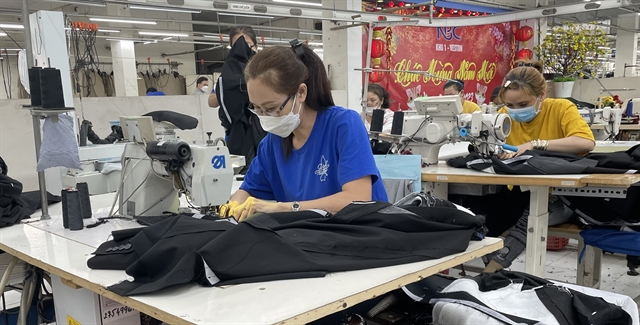 Society
Society


|
| Labourers working at the fashion suits production zone of Nhà Bè Garment Corporation in HCM City. — VNS Photo Thu Hằng |
Thu Hằng
HCM CITY — Nearly 500 enterprises in HCM City need to recruit around 14,370 employees in the first quarter this year, according to the city’s Department of Labour, Invalids and Social Affairs.
Recruitment demand of enterprises in the garment, textile and footwear sector is highest with 5,000 positions during the period, followed by the electronics sector with 2,200 positions and the trade and services sector with 1,000 positions.
More than 95 per cent of employees in the city returned to work after the Tết (Lunar New Year) holiday, said Nguyễn Văn Lâm, deputy director of the department.
Manufacturing, trade and services, and tourism activities have recovered well after the COVID-19 pandemic, Lâm said.
Many enterprises planned to expand production and recruit new employees in the first months of the year to meet the rising number of orders, he said.
Enterprises in the garment, textile and footwear sector have maintained normal production to meet signed orders until mid-year and stepped up efforts to get new orders for the last six months of this year, he said.
Recruitment demand in the manufacturing sector in the city is estimated at 40,000 positions this year.
Enterprises in industrial parks and export processing zones need to recruit more than 12,500 labourers this year, he said.
As the labour market has seen unpredictable fluctuations, expectations of employees have changed, he said.
Occupational stability and job security are top concerns of employees.
Hoàng Văn Thắng, deputy director of HCM City Employment Service Centre, said the centre received requests from enterprises to recruit nearly 14,000 employees after the Tết holiday.
The centre has coordinated with enterprises to offer employment consultancy services in the city to find suitable candidates, Thắng said.
Many enterprises arranged buses to take their employees to workplaces from many provinces after Tết, he said.
Lê Thị Hà Chi, deputy general director of Nhà Bè Garment Corporation, told Việt Nam News that the company saw a stability in its workforce in the first month of the year and most of employees returned to work after the Tết holiday.
“This year, the company will focus on recruiting highly-skilled and experienced employees,” Chi said.
Recruitment demand for manual workers in the first quarter of the year is much lower than previous years, she said.
Lê Yến Thanh, CEO of IT mobility solutions provider Phenikaa MaaS, said, "demand for human resources in the information technology (IT) sector in Việt Nam is very high, resulting in fierce competition to recruit and retain IT talents among IT companies.”
“To attract highly-skilled and experienced employees, the company offers many benefits and welfare policies,” Thanh said.
Employee expectations
A long-term commitment to a job is now considered a popular choice of employees, according to Navigos Group’s Talent Guide 2023 Report.
Nearly half of the survey participants (44.28 per cent) have no intention of changing to a new job unless they find more potential and better opportunities.
Around 16 per cent of respondents would like to commit to the firms as long as possible and 6.75 per cent of respondents choose to work at the same company for around one to two years.
The psychology of wanting to be sure and safe is having a lot of influence on workers, especially in the context of the current changing economy.
When asked about the factor of loyalty to the company, working environment is the dominant choice at a rate of 11.21 per cent, followed by salary at 10.55 per cent, company culture at 9.56 per cent, business sustainability at 8.05 per cent, and flexible working at 7.27 per cent.
There are some other factors impacting an employee’s motivation to stay with a company such as company reputation, executive management benefits, career advancement, business transparency, and private medical insurance.
Policies affecting income are the top concerns.
About 46 per cent of respondents said they sought a salary to be increased every year by 10 per cent or more.
Regarding allowances, 5.5 per cent of employees expect enterprises to have “better benefits from team building activities, culture, arts and vacation".
They also expect businesses to offer more paid holidays (4.70 per cent) and an increase in basic allowances (4.58 per cent).
Regarding factors that affect changing job decisions, salary and working environment rank as the first and second reasons at 13.56 per cent and 11,27 per cent, respectively, followed by corporate culture, promotions and reward mechanisms.
The Talent Guide 2023 Report, conducted from a survey of more than 4,100 candidates working mainly in 23 different industries, provides a perspective on the current situation of workers’ income in 2022 and expectations for 2023. — VNS




